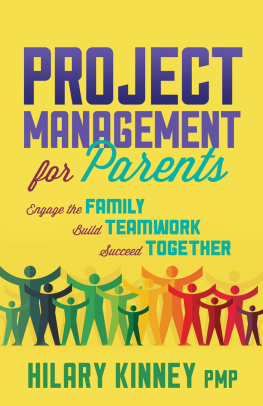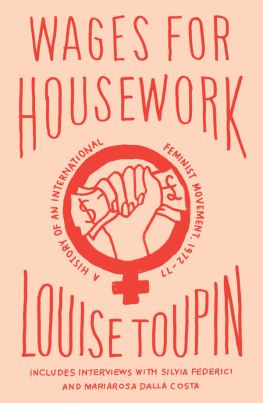CHORES
WITHOUT WARS
CHORES
WITHOUT WARS
Turning Housework into Teamwork
NEW EDITION
LYNN LOTT
AND RIKI INTNER

Copyright 2005 by Lynn Lott and Riki Intner
Previous editions published in 1995 under the title The Family That Works Together... and in 1997 under the title Chores without Wars.
First Taylor Trade Publishing edition 2005
This Taylor Trade Publishing paperback edition of Chores without Wars is an original publication. It is published by arrangement with the authors.
All rights reserved.
No part of this book may be reproduced in any form or by any electronic or mechanical means, including information storage and retrieval systems, without written permission from the publisher, except by a reviewer who may quote passages in a review.
Published by Taylor Trade Publishing
An imprint of The Rowman & Littlefield Publishing Group, Inc.
4501 Forbes Boulevard, Suite 200
Lanham, Maryland 20706
Distributed by National Book Network
Library of Congress Cataloging-in-Publication Data
Lott, Lynn.
Chores without wars : turning housework into teamwork / Lynn Lott and Riki Intner.New ed., 1st Taylor Trade Pub. ed.
p. cm.
Includes bibliographical references and index.
ISBN 978-1-58979-262-3
1. ParentingUnited States. 2. FamilyUnited States. 3. Home economicsUnited States. I. Intner, Riki. II. Title.
HQ755.8.L6764 2005
 The paper used in this publication meets the minimum requirements of American National Standard for Information SciencesPermanence of Paper for Printed Library Materials, ANSI/NISO Z39.481992.
The paper used in this publication meets the minimum requirements of American National Standard for Information SciencesPermanence of Paper for Printed Library Materials, ANSI/NISO Z39.481992.
Manufactured in the United States of America.
CONTENTS
by Jane Nelsen
FOREWORD
When it comes to getting your children to do chores, do you ever say, It is easier just to do it myself!? This is usually followed by a but: But I know it is important for my children to learn responsibility and cooperation.
That latter statement is true; children do need to learn responsibility and cooperation and, with the help of this book, youll find it isnt easier to do chores yourself. Get ready for a rest. Soon youll have every member of your family (yes, husbands, too), joyfully (well, maybe just willingly) pitching in to help with all the household chores, jobs, duties, or whatever else you want to call what it takes to keep your home running smoothly.
Teamwork is a big deal in the corporate worldeveryone wants to be an important, useful, contributing member of the team. It is the best way to be successful. You can create an atmosphere in your home where your children and spouse will see the value of family teamworkand will want to be a usefully contributing member of the family team.
How, you may ask? Well, first you have to go to coaching schoolfound in this book. In Chores without Wars youll learn how to develop an attitude that is encouraging and motivating. Youll learn skills that are encouraging and motivating. Youll learn to see every challenge as an opportunity for learningfor everyone in the family. Youll learn how to coach your family right into the Chores without Wars Olympics.
Will everything be perfect? Not unless you are a saint, your husband is a saint, and all your children are saints. Youll have lots of challenges. (Oh goody, more opportunities for learning!) And youll have lots of skills to handle every challenge.
Have you ever wondered, How can I be the very best parent I can be? After reading Chores without Wars, not only will you end chore wars but along the way youll also learn how to be the very best parent you can be.
Enjoy!
JANE NELSEN
ACKNOWLEDGMENTS
Thanks to all the families who shared problems and stories with us over the years so that our book could be practical and realistic. We send special love to our kids, stepkids, and now, grandchildren, who remind us every day of the fun and satisfaction that comes from families working together. We especially appreciate the efforts of our agent, June Clark, who took the chore out of finding the right home for this extremely helpful book.
INTRODUCTION
TAKING THE WAR OUT OF CHORES
When we tell people we are writing a book called Chores without Wars, we hear three responses. The first and most common is, I could sure use that book. Let me know when its done.
The second response is, Thats impossible! How can there be chores unless there are wars? My kids wont do anything unless I nag, threaten, or coerce them.
The third response is the most surprising. People ask us, When are children old enough to help with chores? When we give them our answer, they either shake their heads in agreement, or respond as the program director of a group of young parents did. We were discussing doing a workshop for her parenting group and suggested the topic Chores without Wars. We explained that this program had two goals. The first was to help parents involve kids in the tasks that keep a household running smoothly. The second was to show parents how chores are a medium through which we can teach respect, resourcefulness, responsibility, organizational skills, and shared decision making. Much to our surprise, her response was, Oh, no, our children are too young for that. We asked how old the children were, and she replied, They range from preschool to third grade.
This thinking is a common mistake many parents make. When children are two or three years old and anxious to help, to push the vacuum or wash the tub, parents often scoot them off to play. The message is, Stay out of the way so I can get this done quickly.
Years later when those same parents start looking for help with messy rooms, dirty dishes, and un-mowed lawns, they discover that their children have heeded their lesson too well and learned to stay out of the way when it comes to doing chores. Now they have to deal with reluctant helpers who wonder, Why is she asking me to do this?
Chores without Wars can save you this grief while helping empower your children. The book offers suggestions to make things work better for everyone in your home, whether there are two or ten of you. Families who have benefited from these ideas say that their children get up to their alarm clocks, clean their rooms, get ready for school, and make their own lunches without one little reminder. They also say that dads who were uninvolved before now pitch in naturally and happily. They walk the dog, feed the cat, take turns cooking and doing dishes, help with laundry, and sweep the floor.
Single parents benefit from these ideas, too. A dad who did everything himself when his sons came to stay now leaves a list of chores for his boys to complete before he gets home from work. His kids suggested this method. It was also their idea to choose items from the list and to do them on their own time schedule. They agreed that if their chores werent done before Dad got home, they would do them immediately if he had to remind them, and they do. Prior to using the methods in this book, this father was angry and exhausted and disappointed in his sons. Now he feels more relaxed and has more time for himself and time to play with the boys.
Chores without Wars also works with busy families whose kids are running in all directions. A family of six whose four children were all involved in sports programs found that leaving lists was hopeless because no one was ever home to complete the chores on the list. When the parents scolded and criticized, the children rebelled, saying they were too busy with practices and games to help. When Mom and Dad asked the children to help figure out a way to get work done that was fair for the family, the kids responded with great ideas. No one in the family thought it was fair for only one person to do all the work. The children knew intimately about teamwork and fair play from their athletic experiences. They were willing to help the family if they could find jobs that didnt need to be done daily. The family brainstormed a list of possibilities and all the kids chipped in.










 The paper used in this publication meets the minimum requirements of American National Standard for Information SciencesPermanence of Paper for Printed Library Materials, ANSI/NISO Z39.481992.
The paper used in this publication meets the minimum requirements of American National Standard for Information SciencesPermanence of Paper for Printed Library Materials, ANSI/NISO Z39.481992.